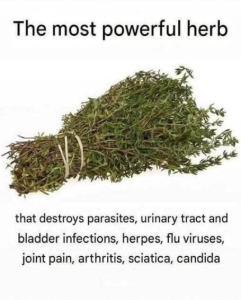
The Most Talked-About Herb for Parasite and Urinary Wellness — And Why People Swear by It
For centuries, cultures around the world have turned to natural herbs to support digestion, immunity, and urinary comfort. Whether used in teas, tinctures, or traditional remedies, many of these plants have been praised for their strong aroma, bitter flavor, or cleansing properties. Among them, one herb has gained a reputation so powerful that some people call it the “most potent natural purifier”: oregano.
But what makes oregano so widely celebrated? And why do people use it for everything from gut support to urinary health? In a world filled with modern medicine, it’s fascinating how a simple kitchen herb continues to capture attention and spark debate. While oregano is not a cure for any disease, its story is undeniably interesting.
First, oregano has a long history of traditional use. Ancient Greeks and Romans believed the herb symbolized joy, health, and protection. They crushed the leaves into oils and used them on the skin or mixed them into food to enhance overall well-being. Over time, oregano traveled across continents, showing up in Middle Eastern preparations, European meals, and folk home remedies from many cultures. It earned a reputation as a “strong herb”—one that wasn’t just for flavor but for vitality.
One of the biggest reasons people today are fascinated by oregano is its naturally strong and distinct chemical profile. The herb contains compounds such as carvacrol and thymol, which are known for their bold aroma and strong flavor. These compounds give oregano its sharp, almost spicy kick. Many people believe that this natural potency is what makes the herb a favorite for traditional “cleansing” practices. Whether or not those beliefs hold scientific weight, they highlight how deeply oregano is rooted in cultural wellness traditions.
Some people use oregano in tea form. They steep the leaves in hot water, creating a warm drink with a powerful, earthy scent. Others prefer oregano oil, a more concentrated extract made from steam-distilled leaves. This oil is extremely strong—far too strong to be used without dilution—and many people use only a drop or two in a carrier oil. Again, this is not a cure for anything, but it remains popular because of longstanding traditional uses and the feeling of “strength” associated with it.
Oregano’s popularity in wellness circles is also connected to digestive support. Bitter herbs, including oregano, have historically been used to stimulate appetite, support digestion, and encourage comfort after heavy meals. In some cultures, oregano tea is sipped after eating to settle the stomach or promote a sense of internal balance. The herb’s intense flavor alone suggests why people believe it has powerful effects.
Beyond digestion, oregano appears frequently in discussions about urinary comfort. Folk traditions have long recommended aromatic herbs—such as oregano, parsley, and rosemary—to help support hydration and general urinary well-being. While none of these herbs cure urinary tract issues, many people enjoy drinking them as teas or adding them to meals because they feel they help keep things “moving smoothly.”
What keeps oregano in the spotlight is the rising interest in natural and holistic wellness. Many people are searching for alternatives or complements to modern methods, not as replacements but as ways to feel more in control of their overall health. This has led to a surge in oregano’s popularity on social media, wellness blogs, and natural living websites. It is often labeled dramatically as a “powerhouse herb,” “cleansing champion,” or “the kitchen spice with ancient strength.”
However, it’s important to remember that oregano is still just an herb—not a miracle cure. The dramatic language used online often exaggerates what any plant can do. Herbs can support general well-being, but they cannot replace medical care, diagnose conditions, or treat infections.
Still, the cultural fascination with oregano offers insight into human behavior. People love the idea of something simple and natural that feels powerful. They are drawn to remedies passed down from their ancestors. They appreciate foods and plants that carry history, tradition, and meaning. And oregano, with its strong scent and deep roots in folk medicine, fits that desire perfectly.
Many people incorporate oregano into their daily routine simply because it makes them feel good—whether by adding it to soups, teas, or diffusers. Others enjoy the sense of ritual: the steeping of a cup of tea, the act of seasoning a meal with purpose, or the belief that a natural herb holds special properties. These rituals bring comfort, which is often just as valuable as any physical effect.
There is also something empowering about learning to use herbs wisely and respectfully. Understanding that oregano should not be consumed in extreme amounts, that oregano oil must be diluted, and that certain people—such as those who are pregnant or taking medications—should speak with a healthcare provider before using it, shows a growing awareness of responsible herbal use.
The fascination with oregano also reflects a larger movement: reconnecting with nature. Modern life is fast, busy, and technology-driven, but herbs remind us of something older and steadier. When people reach for oregano, they often feel connected to traditions that existed long before pharmacies and factories. That connection alone makes the herb feel potent—emotionally, symbolically, and culturally.
While oregano might be called “the most potent herb” in online discussions, what makes it truly special is not its power to cure illnesses—it’s the meaning people place upon it. It represents hope, tradition, cultural continuity, and the human desire to care for oneself using the tools nature provides.
In the end, oregano is not a magic weapon against parasites or urinary problems, but it remains one of the most beloved and widely used herbs in the world. Its strength lies in its flavor, its history, and the comfort it brings to those who use it thoughtfully. Whether sprinkled on food, steeped in tea, or used for aroma, oregano continues to hold a place of honor among natural wellness enthusiasts everywhere.

